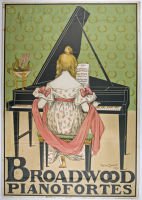 The archives of John Broadwood and Sons held at Surrey History Centre are a rich source for the history of this world famous piano manufacturing company and the many thousands of instruments they made. The company numbered Beethoven, Chopin and Liszt among its customers, and the piano used by Chopin on his visit to England in 1848 can be seen in the Cobbe Collection at Hatchlands Park, East Clandon.
The archives of John Broadwood and Sons held at Surrey History Centre are a rich source for the history of this world famous piano manufacturing company and the many thousands of instruments they made. The company numbered Beethoven, Chopin and Liszt among its customers, and the piano used by Chopin on his visit to England in 1848 can be seen in the Cobbe Collection at Hatchlands Park, East Clandon.
The Broadwood family bought Lyne House, near Capel, in 1799, and the archives were rescued from the house after the death of Captain Evelyn Broadwood in 1975. Extensive use is made of the archives to trace the ownership history of individual pianos. Each instrument had a serial number and the records show when the piano was finished, the date it was sold and the original purchaser. Some pianos were also hired out, including for concert use. For the 1862 International Exhibition in London, at which the company won a gold medal, they produced a booklet containing the astonishing statement that they had produced 124,048 pianos between 1780 and 1861.
Home entertainment in the 19th century often revolved around the piano in the parlour, and Broadwoods thrived on this rapidly expanding home market. They also exported overseas, mainly to 'Empire' destinations such as Australia, India, New Zealand and South Africa. In the earlier part of the 19th century, North and South America were also important markets for pianos. Broadwood pianos even reached such remote outposts as the Falkland Islands and St Helena. The archives show that on 29 March 1816 a square piano for Baron Sturmer, the Austrian Commissioner appointed to supervise Napoleon in his exile on St Helena, was delivered to Portsmouth. The Baron sailed from there on 21 April on a British frigate bound for St Helena. On 25 May 1881 an upright piano was shipped to the Rev L E Brandon, who was Colonial Chaplain at Port Stanley, Falkland Islands.
On 4 August 1914, the day Britain declared war on Germany, the Broadwood factory was on its annual holiday and business continued as normal - on that day a piano was sold to Selfridges. At the end of the month 7 pianos were despatched for New Zealand. However other entries in the porters' books, which record the comings and goings of the pianos, soon start to hint that all was not normal. On 8 August Captain G A Sullivan of the Oxfordshire Light Infantry, who was in barracks at Aldershot, sent in his grand piano to be warehoused. Five days later his battalion sailed for France.
Broadwoods frequently provided pianos for passenger ships. At the outbreak of war the Admiralty immediately started to requisition ships for military use. One such was the Orient Steam Navigation Company's Royal Mail Ship (RMS) Otranto, and on 10 August the records show that 5 Broadwood pianos were brought from the ship, then berthed at Tilbury Docks. The Otranto was converted into an armed merchant cruiser and saw service throughout the First World War before being sunk as the result of a collision in 1918.
See also:
Image
- Broadwood Pianofortes poster, signed 'Claire Gaudet, 1904' (reference 7568/1/4). Printed by Eyre and Spottiswoode

